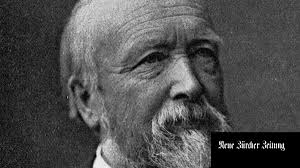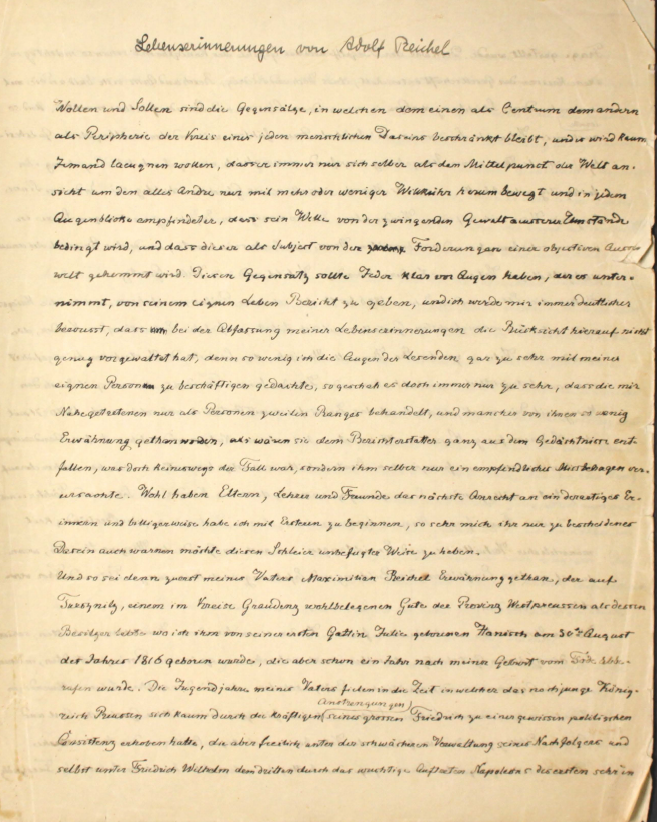Adolf Reichel
106-pages biography from his manuscript (German).
Memoirs (1892)
Of the Beautiful and the "Intrusion of the Unbeautiful". The wanderings and transformations of a Swiss composer in the Europe of Romanticism and Revolution.
Edited from the manuscript by Mathis Reichel and Max Sommerhalder.
Memoirs (1892)
Of the Beautiful and the "Intrusion of the Unbeautiful". The wanderings and transformations of a Swiss composer in the Europe of Romanticism and Revolution.
Edited from the manuscript by Mathis Reichel and Max Sommerhalder.
Abridged version
The Swiss composer Adolf Reichel (1816-1896)
(Max Sommerhalder)
Adolf Reichel (1816-1896) was one of the very few composers of the Classical and Classicist Romantic periods who were not only born in Switzerland, or sojourned or died there, but also desired to be Swiss and had Swiss citizenship, and he was by no means the least significant of them. The simple reason why he has been completely forgotten until recently is that the whereabouts of his over 700 manuscripts had remained unknown for almost a hundred years. Retrieved in 2012, Reichel's compositional legacy is now in the library of the University of the Arts in Bern, catalogued online by the RISM and the object of a doctoral thesis.
Adolf Reichel was born in Tursnitz, West Prussia (now Tursnice, Poland) into a family of music-loving landowners. He received his first music lessons in Danzig, Thorn and Berlin; later he studied composition in Berlin with Siegfried Dehn (who was also the teacher of Michail Glinka, Peter Cornelius and Anton Rubinstein) and piano with Mendelssohn's teacher, Ludwig Berger. After stays in Meiningen, Dresden, Vienna, Bern and Brussels, he settled in Paris in 1844 as a piano teacher and composer, where he was closely acquainted with Chopin and George Sand, experienced the revolution of 1848 and stayed for 13 years before moving to Dresden where he had been appointed lecturer in composition at the Conservatory as well as director of the Dreyssigsche Singakademie in 1857.
Adolf Reichel was known as the closest friend and long-time companion of the Russian anarchist and revolutionary Michail Bakunin whom he had met in Dresden in 1842. Though diverging in many respects, the two men were linked by an almost symbiotic interdependence. In Paris, Bakunin introduced Reichel to a circle of dissidents, revolutionaries and socialists including Georg Herwegh, Heinrich Heine, Gottfried Kinkel, Karl Marx, Pierre-Joseph Proudhon and Alexander Herzen. The latter's Russian friend and assistant Mariya Kasparovna Ern became Reichel's wife in 1850. His handwritten memoirs are preserved in the International Institute of Social History in Amsterdam and are a fascinating testimony of the agitated social and musical life in 19th century Europe.
"The prevalence of Prussian militarism" and Reichel's "longing for a life on freer ground" (quotations) prompted him to accept a call to Bern as music director in 1867. He officiated as principal conductor of today's Bern Symphony Orchestra, head of the conservatory and - de facto a political refugee - hastened to acquire Swiss citizenship already in 1869. A continuous dynasty of Swiss musicians descends from Reichel and Ern, comprising six generations by now and including, among many others, Alexander Reichel (cellist, composer, federal judge and co-founder of the Social Democratic Party of Switzerland), Henri Ern (violin virtuoso and professor in the U.S.A.), Helen Vita (singer, actress and cabaret artist).
Reichel's pupils include August Klughardt, Yuriy Golitsyn, Margarete Stern and Alexander Taneyev. During his lifetime, various of his works were printed by renowned publishers such as Bote & Bock, Breitkopf & Härtel, S. Richault and others. His oeuvre includes two completed symphonies and other orchestral works, a piano concerto, sacred works for solos, choir and orchestra, an opera, chamber music, piano works and theoretical books, but above all a large number of songs. Musically conservative-minded like his teacher Dehn, Reichel was nevertheless a masterly composer and a highly educated and productive, versatile and interesting musician.

